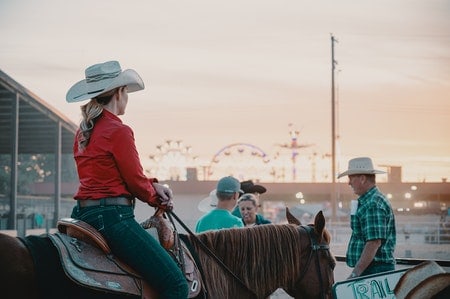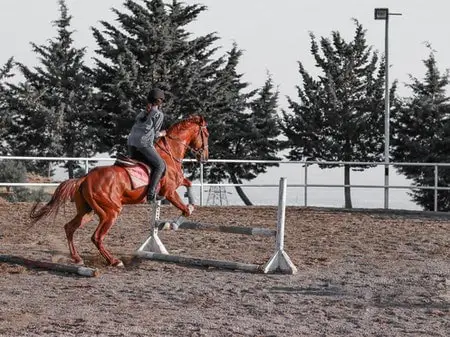Horses are large animals, and people ride them for different purposes. If you are one of those people who ride them frequently, as a pastime, for sports or any other purpose, you may be wondering if horse riding hurts the animal.
Riding a horse will not hurt the animal if you do it in the right way. What this means is that you must have learnt how to ride properly, but not only that, you should also be patient and kind with the animal. There are lots of things that you would need to learn if you are to ride a horse in the right way and you must have the patience to learn all of them before you begin carrying all this activity regularly.
Apart from knowing how to ride, you must make sure that the horse you are riding is in good shape and is healthy. A sick or frail horse will be hurt if you ride it. The same goes for if the horse is injured. You should allow such animals to become fit and heal before attempting to ride them if not, you are going to hurt them while riding.
What are the signs that my horse is uncomfortable or in pain?
As mentioned earlier, riding a horse requires care, and you should consider the comfort of the animal. Therefore, you should make sure that the bridle, bit and every other accessory that you are using fits your horse well, and it can work with them without feeling discomfort. Also, make sure that your horse is healthy and is uninjured before you start riding.

Once you have taken care of these basic requirements, you may ride the horse, but that is not all. While riding, you still need to be in tune with the animal and take note of its body language so that you would know if at any point you are hurting it. If you notice your horse exhibiting any of the signs below, the animal is likely in pain, and you should not ride it until it is alright again.
- Stiff ears that are held back: A horse will usually have perky ears when it is looking at something. However, if it pins back its ears, it is most surely uncomfortable.
- Repetitive tail swishing: repeated tail swishing in a horse while you are riding it indicates that the animal is not comfortable with your riding style, for instance, your leg cue. Also, it could be that its saddle doesn’t fit well, so you should adjust it and any other equipment that needs to be adjusted.
- Head tossing, either from side to side or up and down: a horse will also toss its head if it does not like something you are doing while riding it, like the bit pressure.
- Widely opened eyes: This indicates that the animal is much stressed.
- A raised head and hollow back: your horse might be in pain if it raises its head while its back is hollow. Along with these two gestures, the animal might also swish its tail.
- A clamped down tail: If you are riding your horse and it clamps its tail down, it means that it is in pain or is not comfortable. If you notice this, check to see that the animal’s tack fits it and make sure that it is not ill or injured.
How can I tell if my horse is comfortable when I’m riding it?
The happiness and comfort of your horse, both when you are riding it and when you are not, should be of prime importance to you. If you notice that your horse is not happy or comfortable, you should take measures to ensure that the animal is happy.

Below are the signs that your horse is happy:
- Snorting: While riding, a happy and comfortable horse will breathe out and will make snorting sounds. If you notice your horse producing this sound, then it shows that the animal is happy.
- A Swinging tail: A horse that is comfortable and happy will swing its tail while it is being ridden, as its tail will be loose.
- Floppy ears: As with most pets, you can read the body language of a horse to know what the animal is feeling. A part of a horse’s body that lets you know if the animal is comfortable or not while you are riding it is its ears. Floppy ears indicate that the horse is comfortable and not in pain. You will notice that your horse’s ears will flop in unison with its body as it moves. On the other hand, ears that are stiff and unmovable indicate that your horse is in discomfort, and so you should take note of that.
- Normal droppings: Even though it may seem weird, you can determine if your horse is happy or not from its droppings. Horses that are stressed will not defecate as they usually do. Therefore if your horse’s droppings are not as much as usual or it doesn’t defecate, it could be that it is stressed.
- Relaxed lip line and nostrils: When horses are happy, their nostrils are usually soft and relaxed. On the other hand, if they are unhappy, their nostrils will become tight and drawn. The same goes for their lip line. A happy horse will be soft and relaxed while it will be tight and drawn if the animal is tense.

Conclusion
Horse riding does not necessarily hurt a horse, provided the rider knows what he is doing and has learnt how to ride a horse well. On the other hand, people who do not know how to ride well will inevitably hurt a horse with some of their actions while riding.
It is, therefore, best that before you begin to attempt riding a horse, you have learnt and mastered the art. Numerous riding schools offer lessons on how to ride a horse, and you can go to any of them, or you could learn from a skilled and professional horse rider.

